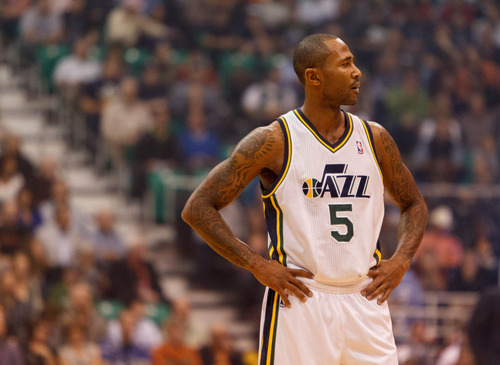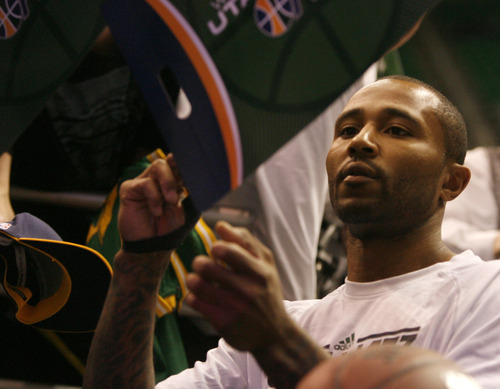This is an archived article that was published on sltrib.com in 2012, and information in the article may be outdated. It is provided only for personal research purposes and may not be reprinted.
Mo Williams didn't watch game film when he played for the Clippers. Not on his own, like he does now. Not on a laptop computer on late-night flights or in hotel rooms.
"I wasn't asked to," the Jazz's point guard said.
Williams, who is in his second stint with the Jazz and a pending free agent, knows things are different for him here. In Los Angeles, he was expected to score in bunches off the bench, backing up Chris Paul. In Utah, Williams' job is more nuanced, and he has some catching up to do 10 years into his career. Williams watches each of the Jazz's games and every upcoming opponent's previous two games.
"My job was easy last year," Williams said. "All I had to do was come in and provide a spark to the team. I wasn't happy because I felt like I could have gave a lot more, but for that team, that's what they wanted me to do."
Williams, a shoot-first point guard who replaced the like-minded Devin Harris, is attempting what almost is impossible for a veteran player: a rethinking of the way he plays the game. On a team loaded with young talent, Williams is no longer responsible just for getting his own shot as he was in L.A., and to a lesser extent in previous stops in Cleveland and Milwaukee, but also for helping young players get shots and develop their own games.
"I remember when he first got here, he said he wanted to show all the doubters that he could be a pass-first point guard," Jazz center Al Jefferson said.
The transition has been awkward at times. Williams has attempted more shots than all but three NBA point guards (154) despite missing a game with one of the two injuries that nags him. And he is hoisting 14 attempts per game to average 14.9 points. But Williams also averages 6.8 assists (his career average is 4.9), which forward Marvin Williams said is evidence that the point guard is finding a good balance.
"There are scoring point guards out there that average 3 assists and 17 points," Marvin Williams said. "We don't have that problem on this team."
Mo Williams distributed 14 assists, one off his career high, in a triple overtime victory in Toronto on Nov. 12, but he made one of his most visible errors two nights later. With the Jazz trailing by four in Boston, Williams missed a transition 3-pointer on the heels of having made one despite having Randy Foye in the corner and Paul Millsap running through the lane. Boston closed the game on a run and beat the Jazz 98-93.
The shot was criticized by coach Tyrone Corbin, who called it a "home run hit" and said Williams knew immediately it was the wrong choice.
"I'm not questioning whether he can make it," Corbin said. "Just whether it was the right time."
Earlier this month, Williams scored 15 points in a quarter against San Antonio and was heralded for his aggressiveness.
"He's going to miss some, too," Gordon Hayward said, "but you have to live with that."
Earl Watson, the Jazz's longest-tenured point guard, said Williams has adjusted well, but that changing teams — and styles and mentalities — is the toughest thing for a point guard.
However, Watson said Williams doesn't get enough credit for playing through a strained right adductor, which forced him to miss a Nov. 10 win over Phoenix, or an injured right thumb, which he suffered Nov. 12 in Toronto.
"When you play with an injury," Watson said, "no one judges you off being injured. Everyone looks at you and holds you accountable as if you were healthy, and that's just not a reality."
Williams tries to compensate with effort and, as part of that, watching and rewatching games. He's still learning his new team 12 games into the season.
"I think that was my biggest adjustment," he said, "kind of knowing where to get these guys the ball. Want to call the right plays for them to get shots."
Twitter: @tribjazz —
Sacramento at Utah
P Friday, 7 p.m.
TV • ROOT





